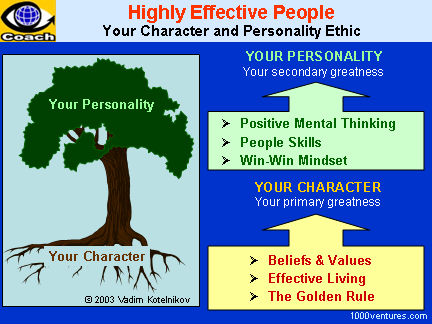|
| |
You are what you think
Your thoughts shape your attitudes, principles, intentions,
actions and
your entire life.
If you want to change your life,
change your thinking.
The clearer you are about what you value and believe in,
the
happier
and more effective you will be. |
|
 |
| |
Two Types
of Beliefs
According to
NLP
psychology of success, there two types of beliefs.
Empowering
Beliefs:
related to excellence and how it could be achieved.
Limiting Beliefs: your behavior is
not what you want, but you think you cannot change it. Change,
replace or discard completely such beliefs! |
|
 |
Man is made by his belief. As he
believes, so he is. |
Bhagavad
Gitta |
| |
Beliefs
Beliefs are the assumptions we make about ourselves, about others in the world
and about how we expect things to be. Beliefs are about how we think things
really are, what we think is really true and what therefore expect as likely
consequences that will follow from our behavior.
According to Jemie Smart, an
NLP
guru, you can model beliefs as ‘feed-forward’ mechanisms that sort and filter
data in order to prove themselves to be true. Beliefs are valuable resources,
generalizations that people use to give themselves a sense of certainty and a
basis for
decision-making
in an uncertain and ambiguous world.
|
|
 |
If you
think you can, you can.
If you think you can't, you're right. |
Mark Twain |
| |
The Power of
Positive Beliefs
You see what you believe. You attract to
yourself those experiences that match your existing belief system. Change
your thoughts to improve your life and expand your mind. Replace beliefs
that are hindering your development with positive ones that will help you...
More
|
| |
What Do You Believe About Yourself?
What you believe about yourself defines what happens to you.
Many of the limitations you face in life are self-imposed. What you believe
about yourself can keep you locked behind your fears or thrust you forward
into living
your dreams.
You become what you believe you are.
Think of yourself as a work in progress.
Actually, we all are. Identify old limiting beliefs that may be holding you
back and get rid of them...
>>>
|
| |
Why It Is Difficult
To Change Beliefs?
①
You beliefs operate on a
subconscious
level
②
You may mistake your beliefs for the truth
③
You see what you believe |
| |
NLP Presuppositions
The presuppositions are the central principles
central of
NLP; they are its guiding philosophy, its ‘beliefs’. These
principles are called presuppositions because you pre-suppose them to be
true and then act as if they were. You then discover what happens. If you
like the results then continue to act as if they are true. They form a set
of ethical principles for life...
More |
| |
Values
Values are about how we have learnt to think things
ought to be or people ought to behave, especially in terms of qualities such as
honesty, integrity and openness. |
| |
Define and Prioritize Your Values
Clarify your values. You ask yourself, “What values and
virtues do I most admire and wish to incorporate in to my life?” If you want
to
discover
your strengths in the business world, first you would define your values as they
apply to
entrepreneurship. Often, both companies and individuals will choose
values such as
value creation,
social responsibility,
integrity, quality,
respect for others, service,
innovation, and
profitability.
Use those values to define your position with regard
to
your life and
business. The values you choose, and the order of priority you
place on your choices, will determine your approach to your life and
business.
|
| |
Basic
Assumptions
Basic assumptions are our long-learnt, automatic
responses and established opinions. We are, ourselves, almost always unaware of
the nature of our own basic assumptions, but they are enacted through our
behavior - what we say and do. Basic assumptions are usually rooted in our
infancy, early family life and social context. More widely, assumptions shaping
our behavior relate to cultural context
(See
East vs. West: Philosophy and
Cultural Values) |
| |
Attitudes
Attitudes are the
established ways of responding to people and situations that we have learned,
based on the beliefs, values and assumptions we hold. Attitude become manifest
through our behavior. |
|